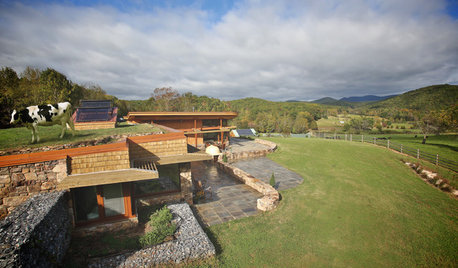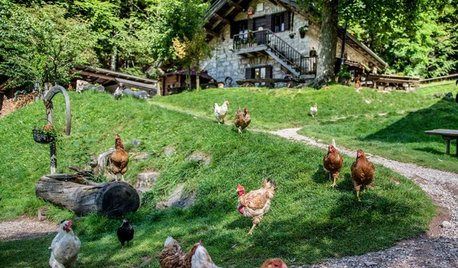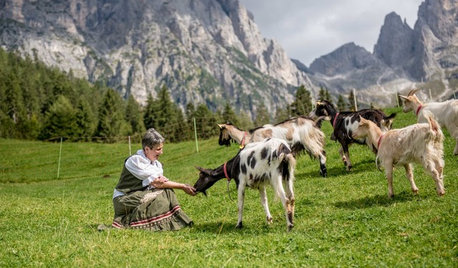dairy sheep vs milk goat
dannic_az
18 years ago
Related Stories

PRODUCT PICKSGuest Picks: Fresh Milk
Creamy white shades, milk bottle shapes and other dairycentric designs can refresh your decor
Full Story0

HOUZZ TOURSHouzz Tour: A Self-Sufficient Farmhouse With a Sheep-Pasture Roof
LEED Platinum certification and a soil-covered top make this pastoral Virginia home green in more ways than one
Full Story
HOMES AROUND THE WORLDMy Houzz: A Family’s Rustic Refuge for Travelers in the Italian Alps
High up in the Dolomites, a mountain dairy farm and restaurant offer up old-fashioned hospitality, memories and tranquillity
Full Story
TRAVEL BY DESIGN9 Vacation Farmsteads Offer a Taste of Country Life
Have a hankering for fresh air and even fresher food? Try a farmhouse, cabin or well-equipped tent for your next vacation
Full Story
TRADITIONAL HOMESHouzz Tour: Connecticut Farm Restored for Generations to Come
A man renovates his extended family’s stately farmhouse and land. Sustainable practices are used in gardens, wetlands and recreation areas
Full Story
HOUZZ TOURSHouzz Tour: 10 Acres, 3 Generations and Many Animals in North Carolina
Check out a throwback-style cabin that celebrates simplicity, reclaimed materials and family
Full Story
FARMHOUSESWorld of Design: See How 9 Families Live and Farm on Their Land
Join us as we visit the homes and farms of passionate food producers and hear about rural life around the globe
Full Story
FARM YOUR YARDRemake Your Backyard Into a Mini Farm
You can get a taste of country life by line-drying your laundry, growing some produce or going whole hog with the critters
Full Story
HOUZZ TV FAVORITESHouzz TV: A New England Farmhouse Explodes With Color
Creativity and color burst from every corner in this unique 18th-century Massachusetts home for an artist and her family
Full Story
FARM YOUR YARDTo Get the Food They Believe In, These Urbanites Grow Their Own
Home gardeners farming on their city lots find that local, organic food isn’t the only reward
Full StorySponsored






lesli8
sharon_sd
Related Professionals
West Milford Landscape Architects & Landscape Designers · Forest City Landscape Architects & Landscape Designers · Hartford Landscape Contractors · Bedford Heights Landscape Contractors · Belvedere Park Landscape Contractors · Bowie Landscape Contractors · New Berlin Landscape Contractors · South Lake Tahoe Landscape Contractors · Thornton Landscape Contractors · West Palm Beach Landscape Contractors · Woodland Landscape Contractors · Winter Gardens Landscape Contractors · Southampton Siding & Exteriors · St. Louis Siding & Exteriors · Thornton Siding & Exteriorslesli8
sharon_sd
lesli8
huisjen
dannic_azOriginal Author
mountainman_bc
sharon_sd
dannic_azOriginal Author
mountainman_bc
sharon_sd
mountainman_bc
lesli8
Macmex
oberhasli1
Macmex
dannic_azOriginal Author
Macmex
oberhasli1
roostersgirl
lambs.r.cute
neub1031_expressics_com
dchu73_gmail_com
doninalaska
terry51
PaulAndAshia
shining
quellcrist